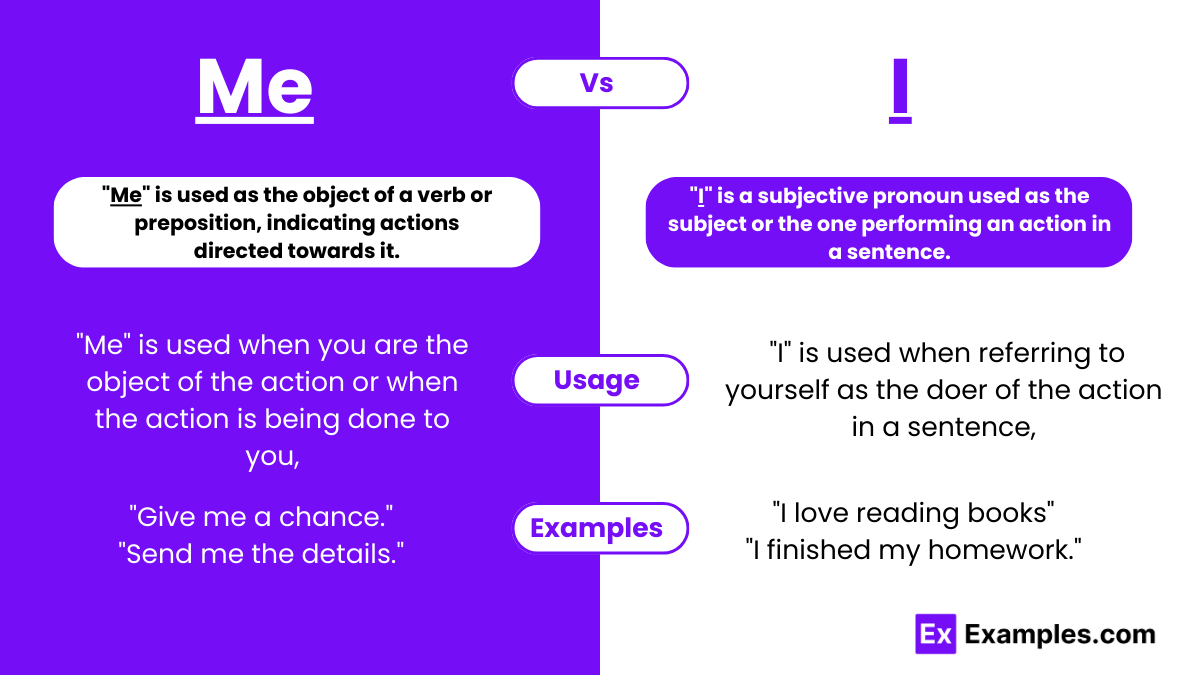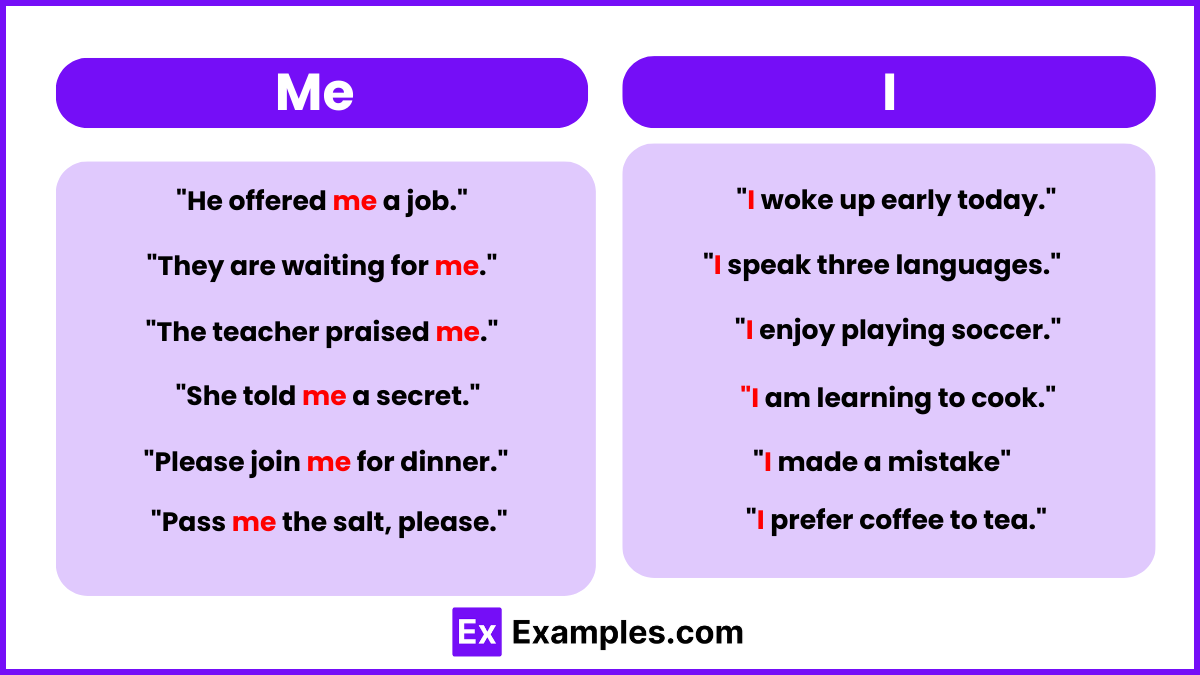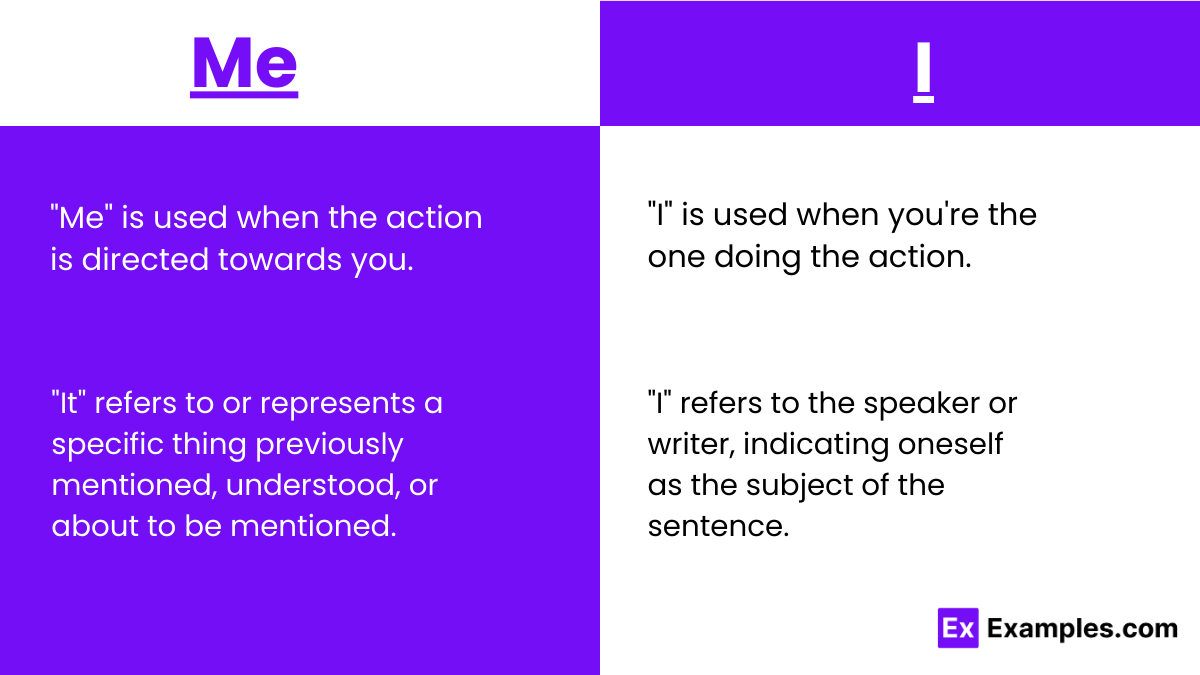Me vs I
Navigating the use of “Me vs I” in English grammar can often trip up both native speakers and learners alike. The distinction hinges on their roles within a sentence: “I” serves as the subject, the doer of the action, whereas “me” functions as the object, the receiver of the action. Simple sentences like “I ate the fish” and “The fish ate me” clearly illustrate this fundamental difference. However, as sentence structures grow more complex, determining the correct choice between “me” and “I” can become challenging, leading to common errors and confusion.
To demystify this grammatical conundrum, it’s essential to grasp the underlying rules: use “I” when you are carrying out an action, and “me” when an action is directed at you, whether it’s being done to, for, with, or without you. This straightforward guide aims to clarify the appropriate contexts for “me” and “I,” shedding light on typical pitfalls and providing clarity. By understanding these basics, students can enhance their grammar skills and communicate more effectively, ensuring their sentences are both grammatically sound and stylistically polished.
Me and I – Meanings
Meaning of “Me”: On the contrary, “Me” is an objective pronoun, employed when the pronoun serves as the object of a verb or preposition within a sentence—meaning actions are done to it. In the construction “The manager praised me for my work,” “me” is receiving the action of praise, thus being the object. “Me” is also used in compound objects, such as “The task was assigned to my partner and me.” It denotes that the speaker or writer is the recipient of the action rather than the initiator.
Meaning of “I”: “I” is classified as a subjective pronoun in English grammar, meaning it is used when the pronoun acts as the subject of a sentence or clause—the doer of an action. For example, in the sentence “I finished the report,” “I” is performing the action of finishing. “I” is essential when you are referring to yourself as the one taking an action or when you are one of the subjects in a compound subject, such as “My colleague and I collaborated on the project.” It positions the speaker or writer as the active participant in the sentence’s action.
Summary
In English grammar, “I” serves as the subject pronoun, used when the speaker is the doer of an action, as in “I ate the fish,” whereas “me” functions as the object pronoun, employed when the speaker is the recipient of an action, exemplified by “The fish ate me.” Despite this clear distinction, certain complex sentence structures can lead to confusion in choosing between “I” and “me.” It’s crucial to discern whether you are performing an action or having an action done to you to ensure accurate usage of these pronouns and navigate the common pitfalls that accompany their application.
Difference Between Me and I
The distinction between “Me” and “I” is a fundamental aspect of English grammar, often causing confusion due to their similar functions as pronouns referring to the speaker. However, they serve different grammatical roles within a sentence. “I” is used as a subject pronoun, indicating the person performing the action, while “Me” serves as an object pronoun, used when the action is directed toward the speaker. Grasping this difference is crucial for constructing grammatically correct sentences and conveying the intended meaning accurately. Below is a table that outlines ten key differences between “Me” and “I” to help clarify their usage.
| Aspect | Me | I |
|---|---|---|
| Grammatical Role | Object pronoun | Subject pronoun |
| Function in a Sentence | Receives the action | Performs the action |
| Position | Typically found after the verb or preposition | Usually placed before the verb |
| Usage in Compound Structures | Used in compound objects, e.g., “She told John and me.” | Used in compound subjects, e.g., “I and John went.” |
| Conjunctions | Often follows conjunctions like “to,” “for,” “with,” e.g., “with me.” | Precedes conjunctions, as in “I and…” |
| After Prepositions | Always used after prepositions, e.g., “to me,” “for me.” | Never used directly after prepositions |
| With Infinitives | Common in infinitive phrases, e.g., “for me to do.” | Not used with infinitives |
| Emphasis | Less emphasis on the doer | Emphasizes the subject as the doer |
| Formality | Consistent use in formal and informal contexts | Consistent use in formal and informal contexts |
| Common Errors | Misused as a subject, e.g., “Me went to the store.” | Misused as an object, e.g., “She saw I at the store.” |
Understanding and applying these distinctions will enhance the clarity and grammatical accuracy of your communication, ensuring that you always choose the correct pronoun for your sentences.
Examples of Me and I
The pronouns “Me” and “I” are fundamental elements of English grammar, each serving a unique purpose within a sentence. “I” is used as a subject pronoun, meaning it stands for the person performing the action of the verb. Conversely, “Me” is utilized as an object pronoun, representing the individual that the action is being done to or for. Mastering the use of these pronouns is key to crafting grammatically sound and coherent sentences. Below are examples to demonstrate the correct application of “Me” and “I” in various contexts.
Examples of “Me”:
- “Could you please give me the book?”
- Here, “me” is the object receiving the book.
- “The gift was a surprise for me.”
- “Me” is the object of the preposition “for,” indicating who the surprise was intended for.
- “She told me a secret.”
- In this sentence, “me” is the object receiving the information.
- “Between you and me, I think we should be cautious.”
- “Me” is correctly used after the preposition “between.”
- “My parents took me to the museum.”
- “Me” is the object of the action, being taken to the museum.
Examples of “I”:
- “I solved the puzzle in record time.”
- “I” is the subject doing the action of solving.
- “My sister and I went to the concert together.”
- “I” is part of the compound subject performing the action of going.
- “I am convinced that this is the right decision.”
- Here, “I” is the subject associated with the state of being convinced.
- “I baked a cake for the party.”
- “I” indicates the person who performed the action of baking.
- “After the discussion, I understood the topic better.”
- “I” is the subject who achieved a better understanding.
These examples aim to clarify the appropriate contexts for using “Me” and “I,” enhancing your ability to communicate effectively and accurately in English.
When to Use Me and I
The correct usage of “Me” and “I” is a common source of confusion in English due to their similar roles as personal pronouns referring to the speaker. However, they are used in different grammatical contexts. “I” is a subject pronoun, used when the speaker is performing the action of the verb. Conversely, “Me” is an object pronoun, used when the speaker is receiving the action of the verb. Understanding when to use each can greatly improve the clarity and grammatical accuracy of your communication.
When to Use “Me”:
- As the Object: Use “Me” when you are the object of the action or when the action is being done to you, e.g., “The teacher called me.”
- After Prepositions: Use “Me” after prepositions, e.g., “This gift is from me.”
- In Compound Objects: When you and another person are the objects, use “Me,” e.g., “The secret was kept from my sister and me.”
- With Imperatives: When an imperative sentence is directed towards you, “Me” is used, e.g., “Give me the book.”
When to Use “I”:
- As the Subject: Use “I” when referring to yourself as the doer of the action in a sentence, e.g., “I am walking to the store.”
- In Compound Subjects: When you and another person are the subjects, use “I,” e.g., “My friend and I are going to the concert.”
- After “To Be” Verbs: When the verb in the sentence is a form of “to be” (am, is, are, was, were), “I” is used, e.g., “It is I who must decide.”
- In Comparisons: When making comparisons using “than” or “as,” use “I” if it is the subject of the implied sentence, e.g., “She is taller than I (am).”
Mastering the use of “Me” and “I” enhances not only the grammatical correctness but also the professionalism and precision of your spoken and written English.
How to remember when to use Me or I
Differentiating between “Me” and “I” can sometimes be tricky, but understanding their correct usage is crucial for proper grammar in English. “I” is a subject pronoun, meaning it’s used when you are the one doing the action. “Me” is an object pronoun, used when the action is done to you. Here are some tips to help you remember when to use “Me” or “I”:
- Complete the Sentence Test: Remove the other subjects from the sentence and see if it still makes sense. For example, in “My friend and I went to the store,” remove “My friend and” and check if “I went to the store” sounds correct (it does).
- After a Preposition: If the pronoun comes after a preposition, like “to,” “for,” or “with,” use “Me.” For instance, “She gave the book to me.”
- Use “I” in Compound Subjects: When you’re part of the subject doing the action with someone else, use “I.” Example: “My brother and I cooked dinner.”
- Use “Me” in Compound Objects: When you and someone else are receiving the action, use “Me.” Example: “The teacher asked my friend and me a question.”
- The “Be” Verb Test: When the verb in the sentence is a form of “to be” (am, is, are, was, were), it’s usually correct to use “I.” Example: “It was I who ate the cookie.”
- The Mirror Trick: Imagine saying the sentence while looking in a mirror. If you’re pointing to yourself as the doer, use “I.” If something is being done to your reflection, use “Me.”
- The Intuition Check: As you become more familiar with English, you’ll start to develop a sense of what “sounds right.” Read extensively and pay attention to these pronouns in context to strengthen your intuition.
By applying these simple strategies, you can demystify the choice between “Me” and “I,” making your English communication clearer and more grammatically accurate.
Using me or I when there’s more than one subject
When constructing sentences with more than one subject, choosing between “me” and “I” becomes crucial for grammatical accuracy. The distinction lies in whether the pronoun is part of the subject (doing the action) or the object (receiving the action) of the sentence. Here are key points to guide you in using “me” or “I” correctly in such contexts:
- Compound Subjects: Use “I” when the pronoun is part of a compound subject, which includes multiple entities performing the verb’s action. Example: “My sister and I prepared the meal.”
- After the Verb: If the pronoun comes after the verb, indicating it’s receiving the action, “me” is typically not used, especially in formal contexts. Instead, rephrase the sentence to maintain clarity.
- Subject Pronoun Test: Simplify the sentence to include only one subject. If “I” works in the simplified sentence, it will also work in the compound subject. Example: Removing “My sister and” from the first example leaves “I prepared the meal,” which is correct.
- Object of the Sentence: If the pronoun is the object (the action is done to it), even in a compound structure, use “me.” Example: “The award was given to my mentor and me.”
- Prepositions: In the presence of prepositions like “between” or “to,” “me” is often correct, even in compound structures. Example: “The secret is between you and me.”
- Conjunctions: When “and” or “or” connects the pronoun with another noun or pronoun in the subject, use “I.” Example: “You and I should collaborate on this project.”
By adhering to these guidelines, you’ll enhance the grammatical precision of your sentences, especially when navigating the complexities of compound subjects and objects.
FAQs
What Is the Rule for Using I or Me in a Sentence?
Use “I” as the subject, performing the action, and “me” as the object, receiving the action. For example, “I wrote a letter” and “She wrote a letter to me.” The choice depends on the pronoun’s role in the sentence’s structure.
What Is a Trick for Remembering When to Use Each?
To decide between “I” and “me,” remove the other subjects or objects from the sentence. If it still makes sense with “I,” that’s your choice. For example, “My sister and I went shopping” becomes “I went shopping.” If “me” fits better, use that instead.
Is It James and Me or James and I?
It depends on the sentence context. If they’re the subjects, use “James and I.” For example, “James and I went to the store.” If they’re the objects, use “James and me.” For example, “She invited James and me to her party.”
Is Me and You Grammatically Correct?
“Me and you” can be grammatically correct when used as objects in a sentence, such as in “She was looking for me and you.” However, it’s more polite and conventional to say “you and me,” especially at the beginning of a sentence





